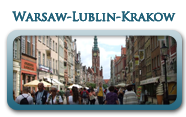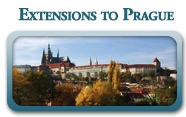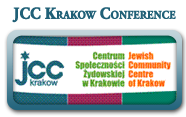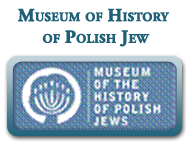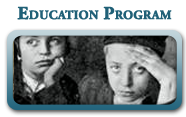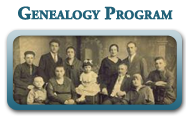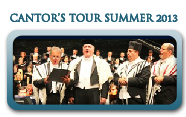|
Poland Jewish Heritage Tours
|
Krakow Jewish Culture Festival
For groups of 10 or more
Tour dates: last week of June (and weekend) annually.
Please contact us for group travel information.
"Krakow, Poland voted one of Top 10 European cities"
-Travel and Leisure Magazine

Take an unforgettable discovery tour of Poland's 1,000-year-old Jewish Heritage and Today's Cultural Revival.
For one thousand years, Poland was the cradle of Jewish civilization, and the majority of world Jewry can claim its ancestral roots there.
Today, Jewish culture in Poland is experiencing an impressive renaissance, and Poland Jewish Heritage Tours offers you a unique and first class experience with front-row seats to witness and participate in the exciting events that comprise this cultural revival.
Explore the past, participate in the present and help shape the future.
- Daytime programs will feature comprehensive sightseeing in and around Warsaw and Krakow, plus private VIP meetings with Jewish academics and civic leaders.
- Evening programs are held in conjunction with the Krakow Jewish Culture Festival where we have reserved front row seats.
- You will attend Festival performances culminating in the Closing Night Concert on Szeroka square in the former Jewish Quarter of Kazimierz. Every summer, more than 15,000 people gather in Kazimierz's old market square for a seven-hour, open air concert.

Departure to Warsaw: “The Phoenix Rises”
Warsaw is known as the ""phoenix city"" because 90% of this national capital was destroyed by Nazi Germany during World War II, and following the war's traumas and tragedies, Warsaw was almost thoroughly rebuilt by the postwar Communist state. Today, it is the country's largest city.
Thus, the guiding metaphor for our journey through Warsaw - a city both deeply burdened and uplifted by its modern history - is that of the phoenix rising.
Arrive in Warsaw:
When flights arrive with groups of 10 or more, a transfer to our hotel will be provided. Smaller groups, or if you arrive on your own, just grab a taxi from the airport and meet us in the hotel (about $25 ride). The hotel is located in the city center, in walking distance to all major historical sites, cultural attractions and commercial areas.
Evening:
We will gather in the nearby Nozyk Synagogue for our tour orientation meeting. The program begins with a welcome and introduction to Jewish Poland by Rabbi Michael Schudrich, the Chief Rabbi of Poland
Dedicated in 1902, the Nozyk (no-ZHIK) Synagogue was the only surviving synagogue from the 300 Jewish prayer houses that existed in Warsaw prior to the Holocaust. Used by the Nazis as a horse stable during the war, the Nozyk was fully reconstructed in 1983, and now serves as an active synagogue with more than 500 congregants. In adjacent buildings are housed community offices, a youth club, kosher canteen, adult educational center and a variety of Jewish organizations including the Joint Distribution Committee.
Dinner on your own. Please take advantage of the List of Restaurant recommendations in your tour packet.
Until 1942, Warsaw was home to the largest Jewish community in Europe and was the world center of Yiddish culture. Almost all was destroyed in WWII. Since the post-1989 revival of Jewish life, the nation's capital claims Poland's largest, most active Jewish community.
Guided tour of Jewish Warsaw, sites and monuments representing the distinguished cultural legacy of Warsaw Jewry and commemorating the fate and resiliency of the Jewish people, rising from the ashes to remember:
- Warsaw Ghetto Monuments -The first ghetto memorial, dedicated by Polish Jews in 1946, resembles a manhole cover, recalling the underground's use of the city sewers as escape and smuggling routes. It is located close to the Monument to the Heroes of the Ghetto, a copy of which stands in Yad Vashem in Jerusalem. The massive two-sided monument was sculpted by Natan Rappaport and unveiled on the fifth anniversary of the Ghetto Uprising in 1948. We will hold a short ceremony to commemorate the 1943 Ghetto Uprising, with poetry and music composed in the Warsaw Ghetto.
Nearby stands a tree and a commemorative marker honoring “Zegota,” an arm of the Polish Government in Exile and Europe's only organization specifically tasked with aiding and rescuing Jews during the Holocaust period. Thousands of Jewish lives were saved thanks to the extraordinary, clandestine efforts of Zegota.
Across from the Rappaport Monument is the site of the Museum of the History of Polish Jews
We will visit the museum and the surroundings:
- Mila 18 - headquarters of the ZOB, a Jewish resistance group in the Warsaw Ghetto during WWII. Discovered by the Germans on May 8, 1943, the leaders of the uprising Mordechaj Anielewicz, Arie Wilner and many others, took their own lives. Two monuments honor their memories and mark their common grave.
- Ghetto Wall Marker No. 21- In 2008, the City of Warsaw in cooperation with the Jewish Historical Institute, erected 21 vertical markers and a series of plaques inlaid in the ground indicating the borders of the Warsaw ghetto.
- Umschlagplatz Monument - a stone monument erected in 1988 resembling an open freight car used to transport Jews to the death camps. It stands on the site in the Warsaw ghetto from which more than 300,000 Jews were deported to the Treblinka extermination camp. Scenes from the film "The Pianist" were filmed just a short distance up Stawski Street.
- Emanuel Ringelblum Jewish Historical Institute (JHI) -The largest repository of pre-war Polish Jewish history, the Institute's most precious holding is the Ringelblum Archives of the Warsaw Ghetto. After touring the actual physical site of the Ghetto and 1943 Uprising, we will be given a rare opportunity to see samples of the diaries, documents, photos and artwork, which were hidden during and miraculously survived the Nazis' total liquidation of the Ghetto. The wartime documentation of the Ghetto was led by historian Emanuel Ringelblum and a team of brave writers and artists, most of whom died in the Ghetto. However, most of their archives, stored in 3 milk cans and ten metal boxes, and then buried in three separate locations in the Ghetto are preserved for posterity at the JHI.
Our bus tour today will also reveal the city's architectural history and urban regeneration, from the renaissance, early baroque and art deco periods, to the Neo-realism of the Stalinist 1950s. Along the Royal Route, first begun in the mid-14th century and restored after WWII, we will see:
- The Royal Castle, Castle Square and the Barbican
- Monument of King Zygmunt III Wasa
- Krakowskie Przedmiescie
- Presidential Palace and Warsaw University
- Copernicus and Mickiewicz Monuments
- Nowy Swiat and Embassy Row (Aleje Ujazdowskie)
- Lazienki Park
- Aleja Szucha 25
- Constitution Square and Marszalkowska Street
- Palace of Science and Culture
Evening:
Dinner and Nightlife on your own.
- Warsaw Jewish Cemetery - One of the largest, preserved Jewish cemeteries in all of Europe, established in 1806, the 250,000 gravestones contain rich historical and genealogical knowledge. This is the burial site of famous writers, artists, poets, as well as religious and political leaders. Most recently Marek Edelman, the last surviving commander of the 1943 Warsaw Ghetto Uprising, was buried here in October 2009.
Depart for Krakow by train in the morning.
Arrive in Krakow in the early afternoon
- Upon arrival, we will transfer to our hotel through this most picturesque city.
Krakow, an enduring legacy:
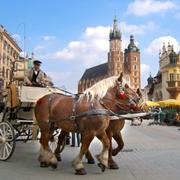 Breathtakingly beautiful, Krakow is the only city in Poland to survive World War II without being physically destroyed by Nazi Germany. For 700 years, Krakow was the heart of Jewish culture for the region of Galicia, where the largest concentration of Jewish communities had spread over centuries. Today, the city's Jewish district, called Kazimierz, holds Central Europe's most important array of Jewish historical monuments, including magnificent synagogues, cheders, prayer houses and cemeteries, which had uniquely survived WWII and were renovated after 1989. Breathtakingly beautiful, Krakow is the only city in Poland to survive World War II without being physically destroyed by Nazi Germany. For 700 years, Krakow was the heart of Jewish culture for the region of Galicia, where the largest concentration of Jewish communities had spread over centuries. Today, the city's Jewish district, called Kazimierz, holds Central Europe's most important array of Jewish historical monuments, including magnificent synagogues, cheders, prayer houses and cemeteries, which had uniquely survived WWII and were renovated after 1989.
Day Tour of Historical Sites of Krakow including:
- Rynek Glowny, Main Market Square - This main square of Krakow's Old Town dates back to the 13th century and is the largest medieval town square in Europe. Surrounded by historical townhouses, palaces and churches, the center of the square is dominated by the cloth hall Sukiennice, which is an enclosed shopping hall where vendors sell crafts and souvenirs.
Our hotel is located in the center of Krakow, convenient to everything including the Rynek Glowny and the Kazimierz Jewish District. Older than Prague's Jewish quarter, Kazimierz is a UNESCO World Heritage Site and the only Jewish district in Poland to have survived the Holocaust. It is defined by seven renovated synagogues and two Jewish cemeteries, which memorialize the past while also in use today.
Evening:
Jewish Culture Festival Concerts
Auschwitz- Birkenau
Today we pay homage to those who suffered and perished in Auschwitz-Birkenau, the notorious Nazi Concentration and death camps established by Germans in 1940.
In 1942-1944, as part of the "final solution of the Jewish question" (Endlosung der Judenfrage), Auschwitz served as the largest Nazi center for the destruction of the Jewish population of the European countries occupied by and allied to the Third Reich.
Our visit will help us to understand the extent of the horror and terror and to appreciate the miracle that anyone survived. Auschwitz-Birkenau has been described by Elie Wiesel as that which "arouses man's most secret anguish.""
Here we will participate in a short memorial service for all who perished at Auschwitz-Birkenau.
* Optional day tour offerings will be provided for those who do not wish to tour Auschwitz-Birkenau.
Evening:
Jewish Culture Festival Concerts
Today we will explore Krakow's enduring Jewish heritage sites. Our tour will include visits to:
- The Kazimierz Jewish District- Krakow's Jewish community, which dates back to the 14th century, was transferred from the heart of Krakow's Old Townby King Jan I Olbracht following a fire in 1495. Jews were relocated to Kazimierz and this became the main Jewish neighborhood (kehilla) in the region and one of the largest Jewish communities in Poland.
- Tempel Synagogue of Krakow - Built in 1862 and beautifully renovated, this Moorish style Reform synagogue, the largest synagogue in Krakow and used during the High Holidays and for special events such as Jewish Culture Festival concerts.
- Stary (Old) Synagogue - A Gothic structure built early in the 15th century, this is the oldest synagogue in Krakow and the oldest synagogue still in use north of the Alps.
- The Old Jewish Cemetery is where some of the most famous Kabbalist rabbis of Poland were buried.
- “Under the Eagle” Pharmacy -During WWII, many Christian Poles, such as Dr. Tadeusz Pankiewicz, helped Jews by providing food and medicine through this pharmacy located in the Krakow ghetto. The ghetto was liquidated in 1943 and the remaining Jews were transported to the Plaszow and Auschwitz camps.
- Schindler's Factory and Plaszow - the site of the former Nazi concentration camp enamelware center, where Oskar Schindler saved almost 1200 Jews, Schindlerjuden("Schindler's Jews"), by employing them in his factories in Krakow and the Czechoslovakia.
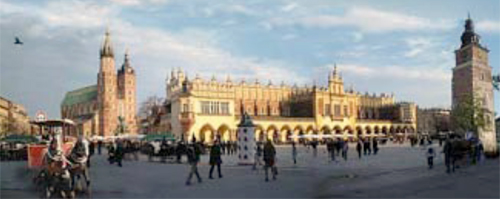
Kabbalat Shabbat Dinner in the old Jewish Quarter of Kazimierz
Morning: (Optional)
Join a Shabbat Morning Service at the historic 16th century Remuh Synagogue (Orthodox service), orthe 19thcentury Moorish Tempel Synagogue (Reform service). Throughout the Day:
.
- Galicia Jewish Museum - The contemporary Galicia Jewish Museum shows exhibits that celebrate the Jewish culture of Polish Galicia and commemorate the Holocaust in Galicia, presenting Jewish history from a new perspective.
Private docent led tours available for our group.
- Jewish Community Center -Commissioned and financed by Prince Charles of Wales and built by the UK's World Jewish Relief Agency, the JCC opened its doors in 2008 and has quickly become the vibrant center of emerging Jewish life in Krakow, offering diverse programs and activities for all ages. Private docent led tours available for our group.
Free time to enjoy Festival Offerings including ongoing art and photo exhibitions, book displays, speakers, and discussions.
Free time to enjoy Festival Offerings including ongoing art and photo exhibitions, book displays, speakers, and discussions.
- Free time to enjoy tourist activities on or around the Rynek Glowny, from shopping and sightseeing to people-watching from one of the outdoor cafes flanking the square.
- Free time to enjoy tourist activities on or around the Rynek Glowny, from shopping and sightseeing to people-watching from one of the outdoor cafes flanking the square.
Evening:
Dinner in Kazimierz, followed by the Grand Finale-Closing Night Open Air Concert on Szeroka Square, Kazimierz!!! Enjoy the streets or the luxury of our own private apartment overlooking the festivities. Begins at 6 pm and continues past midnight.
Wieliczka Salt Mine - This UNESCO World Heritage Site is considered one of the most fascinating places to visit. An active mine for over 600 years from the 13th century until 2007, we will find inside the mine, that the miners have created chambers, chapels, and halls filled with art literally carved out of salt!
If you have seen the Salt Mine in a previous visit we invite you to visit:
- Wawel Royal Castle - Overlooking the Vistula river, Wawel served as a royal residence and the site where the country's rulers governed Poland for five centuries from 1038 until 1596. Wawel is considered to be the most beautiful castle in Central Europe.
- Collegium Maius - the oldest part of Jagiellonian University (1364), now the Museum of the Jagiellonian University with its collection of old scientific instruments, including Copernicus' astronomical instruments.
Evening: Reflect on the last week and relax...
Departure: Transfer to the airport and on our way home, or on to Prague for 3 nights, Budapest, or perhaps just continue your trip to Israel?
Please see our extensions to Prague and Israel.
|
Poland Jewish Heritage Tours
|
 Breathtakingly beautiful, Krakow is the only city in Poland to survive World War II without being physically destroyed by Nazi Germany. For 700 years, Krakow was the heart of Jewish culture for the region of Galicia, where the largest concentration of Jewish communities had spread over centuries. Today, the city's Jewish district, called Kazimierz, holds Central Europe's most important array of Jewish historical monuments, including magnificent synagogues, cheders, prayer houses and cemeteries, which had uniquely survived WWII and were renovated after 1989.
Breathtakingly beautiful, Krakow is the only city in Poland to survive World War II without being physically destroyed by Nazi Germany. For 700 years, Krakow was the heart of Jewish culture for the region of Galicia, where the largest concentration of Jewish communities had spread over centuries. Today, the city's Jewish district, called Kazimierz, holds Central Europe's most important array of Jewish historical monuments, including magnificent synagogues, cheders, prayer houses and cemeteries, which had uniquely survived WWII and were renovated after 1989.




















